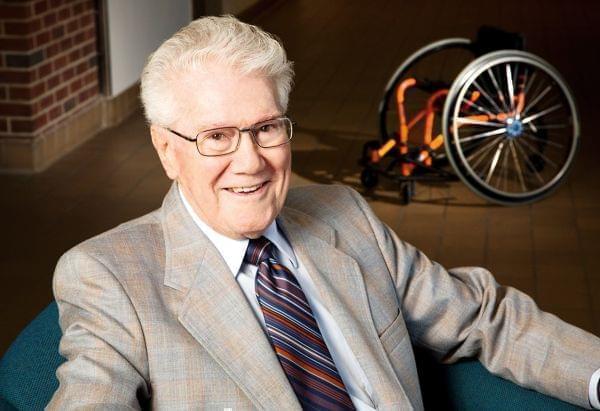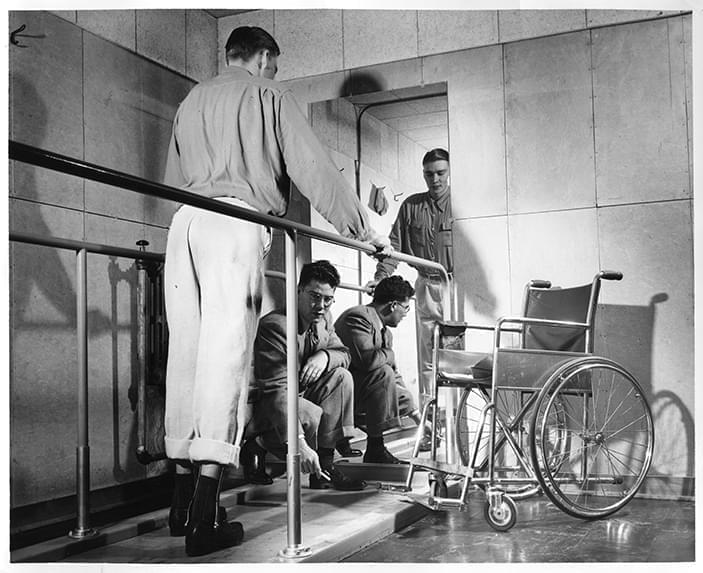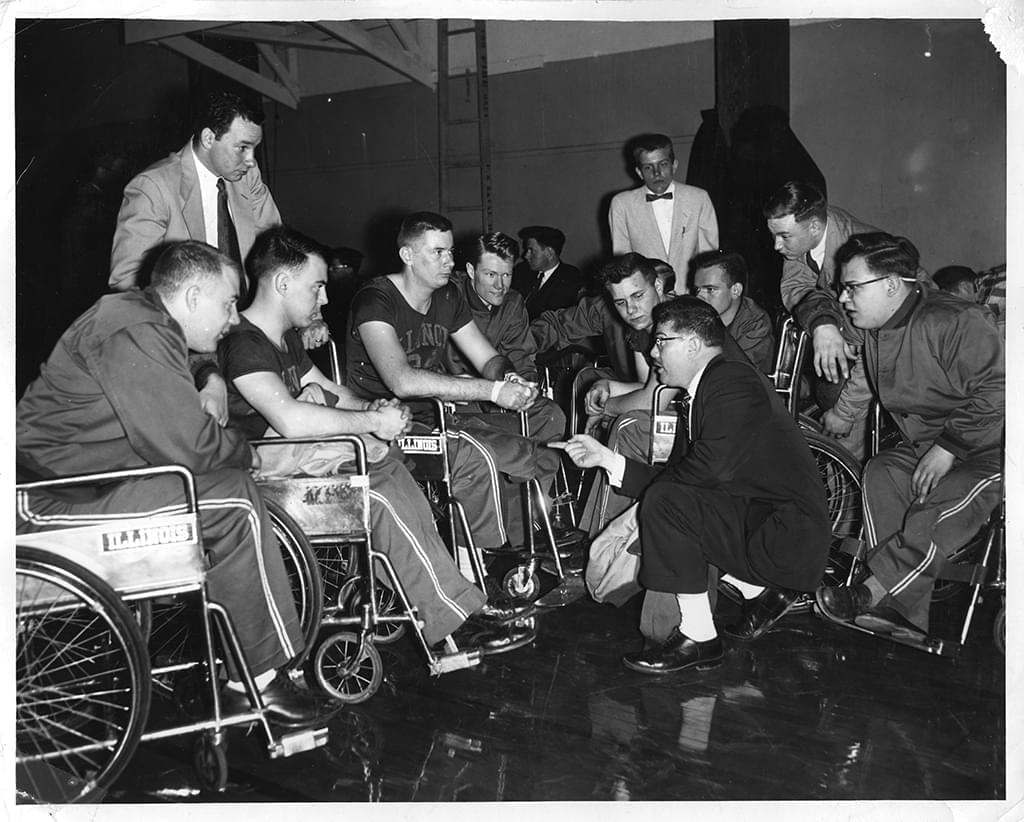New Documentary ‘The Game Changer’ Examines Accessibility Pioneer Nugent’s Early Efforts

Tim Nugent L. Brian Stauffer/ U of I News Bureau
Tim Nugent's efforts to help wounded World War Two Veterans at the University of Illinois' former Galesburg campus turned into starting up the first U.S. university program for the physically handicapped. "The Game Changer," a new documentary on the Big Ten Network, chronicles his efforts to bring disabled students to the U of I's Urbana campus, and creating a model for handicapped accessibility.
The path for Nugent started in World War II, fighting the Battle of the Bulge. While recovering from his own injuries, he got to know those with spinal cord injuries, and others who were no longer accepted publicly.
Around 2,000 students later used the Galesburg campus, a former medical facility for veterans. Its more than 100 buildings worked well, since they were connected by corridors. Nugent was hired to direct the U of I's program there, the first of its kind for those with physical disabilities.

Tim Nugent works to accommodate students at the U of I's Galesburg campus.
“Our philosophy, of course, is that you do not protect people with disabilities, but rather equip them to meet all of the hazards and challenges of life," he said during an interview done in the 1950's.
Much of "The Game Changer" takes advantage of film footage from the University of Illinois Archives shot by Nugent during that era.
"It was a time capsule," said producer Alison Davis Wood, who worked on the film with Kaitlin Southworth and Tim Hartin. "We could see what it was like for Tim in those early years, when he was really fighting to get this program going. We saw how he had the forethought to document what his program was doing."
“(The veterans) were tough,” said Robert DeVore, a student at the U of I’s Galesburg campus who Nugent hired to helped the disabled vets. “There wasn’t a challenge that they would not try – swimming, basketball, anything – they knew they had handicaps, but realized they had to have some education. They were accepted better for the fellow students than they were the citizens of Galesburg.”
In 1949, the U of I closed the Galesburg campus. More than 300 institutions, including the U of I, denied the vets request to attend college elsewhere. Nugent later led a protest in Springfield for their program to be continued.
A legal technicality in the G.I. Bill allowed them to come to Champaign-Urbana. Nugent enrolled his first 14 disabled students in May of 1949.
But it took some convincing before things changed. It was eight years before the U of I's Division of Disabilty Resources and Educational Services (DRES) saw any funding from the university or the state.
Nugent had 90 students in his program by 1954. By then, he had fewer veterans in his program, and more who were born with a disability, or contracted polio as a child.
“(These students) showed people that they had the same emotion, the same desires," said Nugent in a 2015 interview with Illinois Public Media. "They could compete. They could to things like anybody else could do them. I knew from very beginning they had the same aspirations, the same interests, the same talents, and same skills that you and I had, but they had to go about doing it differently."
Slowly, the U of I became handicapped accessable, installing ramps, curb cuts, and researching wider doorways to enable wheelchairs.
A large part of his program was allowing his students to enroll in sports, coaching them in bowling, swimming, and basketball. Wheelchair basketball teams at the U of I have won over 25 national titles.
“I wanted to go to the University of Illinois, because I’ve always gone to the wheelchair racing campus there, ever since I was 15 years old," said U of I graduate and wheelchair athlete Tatyana McFadden, who earned four gold medals and two silver medals in the recently completed Paralympics in Rio de Janeiro, Brazil.

Nugent with the University of Illinois' Wheelchair Basketball team.
Nugent died on Veterans Day, November 11, 2015, at age 92.
"The Game Changer" was funded by the University of Illinois Division of Intercollegiate Athletics and Office of Public Affairs. It premeires at 8 p.m. Thursday on the Big Ten Network, or at the conclusion of the Illinois-Maryland soccer game, which may move the broadcast earlier or later.
Links
- Wheelchair Basketball Group Looks To Build On Nugent’s Vision
- Tim Nugent, The ‘Father of Accessibility’ at U of I, Dies at 92
- Innovator Nugent Getting Honorary Degree From the U of I
- Tim Nugent, game-changer for students with disabilities
- Tim Nugent on Negative Attitudes at the U of I
- Tim Nugent Radio Documentary (30 minutes)
- Tim Nugent on the Beginning of DRES
- Tim Nugent’s Experience Marching on the U of I
- Brad Hedrick on Tim Nugent’s Vision for the Future
- Breaking Down Disability Barriers: The Legacy of Tim Nugent
- Jon Gunderson on Tim Nugent’s Fight to Increase the Independence of People with Disabilities
- Reo Wilhour on Tim Nugent’s Great Ability to Help People
- Davis, Kirk, Seek Congressional Honors For ‘Father Of Accessibility’

